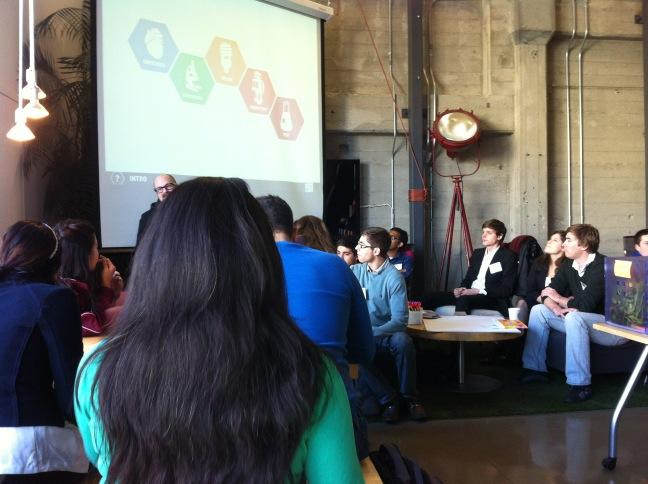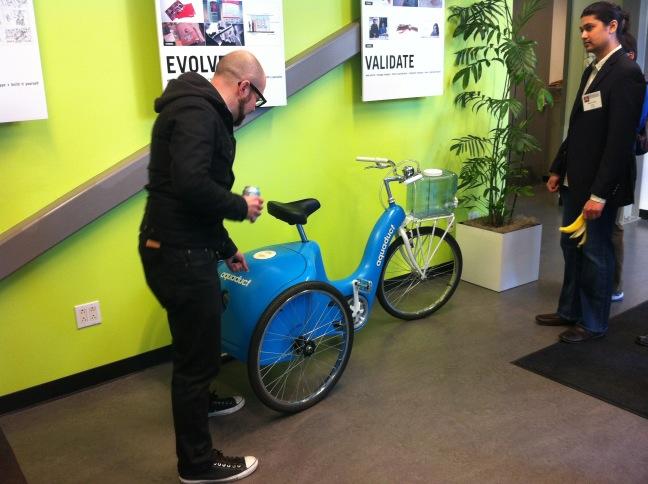After a long 10 days on the move and a redeye return flight I’ve just started to catch up on sleep from the whirlwind tour of Silicon Valley. First, I wanted to include a couple pictures that didn’t make it past twitter from IDEO:
Our seminar in design thinking from the best:
We ended up building a prototype for screens that would play cute/funny videos in airports. Stressed out waiting at the gate for a delayed flight? Look at the puppies and feel your blood pressure drop!
One of many amazing prototypes kicking around the IDEO offices (a bike that pumps water as you pedal!):

And, to put a bow on the trip I took some time to consider and consolidate all of the advice, stories, and experiences that were shared by the great folks who took their time to speak with us.
- There has never been a better time to start a business. There’s a lot of money out there. VC/customer standards are getting higher – only because the barriers to entry (building/distribution) are getting lower. All in all life is getting easier for entrepreneurs.
- It’s all about execution and traction – not ideas. Ideas aren’t worth signing an NDA. VC’s probably can’t think like your customers. Everyone relies on evidence. Build only to elicit customer feedback or observe customer behavior. That should be the driving mantra for everything you do. This is MVP.
- Be intellectually honest. The biggest failures I saw came from great sales. They sold themselves and they sold others on a powerful idea. The rest of the startup exercise was simply confirming the bias. Beware of this tendency (especially if you’re are a natural seller). Use great scientific practice to find a great idea with proven promise. THEN sell the living daylights out of it!
- Think BIG. VCs want markets in the $1B range. Every VC has a sweet spot between ridiculous ($1 Trillion) and to small ($50 Million). It’s hard to say what the limits are but everyone liked business with single digit billion dollar potential.
- Expect to have an early prototype with strong traction, a great team, and a huge market before looking for VC. Angels may only need one of the three to invest.
- Keep in touch. Just like entrepreneurship is a career – not a shot in the dark – everyone you meet in the startup ecosystem is a colleague. Approach everyone from VCs to founders to customers with the knowledge that you’ll see them (especially if they are great) again and again. You’ll develop a relationship over a lifetime – even if they didn’t fund you, work with you, or buy from you. A “no” just means “not yet”.
And, in case you missed my cross-post here’s the post I did for the i-lab blog: What Investors Want with a Twist of d.school.
- Market size is definitely important for VCs, but it isn't so much about how big the market is as how much the revenue opportunity is for your company. The ultimate financial valuation we care about is the exit valuation of the company.
ReplyDeleteCase in point: let's say there are two companies and I can only invest in one. Both have great teams, solid execution, and the opportunity to take a strong position in their respective markets. Their markets are very different though; Gartner says that Company A plays in a market that's $20B with a CAGR of 5%, whereas Company B plays in a market that's$5B with a CAGR of just 6% YoY.
They also have different trading multiples. Both did about $100mm in revenue last year, but A's comps trade at around 4X whereas B's comps trade at around 12X.
Assuming that both companies are going to IPO right after this round, there aren't any changes in market dynamics/technology dynamics, and that the macro markets aren't going to forseeably commit suicide due to some wacky sovereign debt crisis, I'm investing in Company B because my return is going to be higher than it would be with Company A.
This also all assumes that I'm selling my position quickly. If I plan to stick around for another year or so things change, and that market size starts to matter a lot more.
- So spot on when it comes to building a relationship with VCs. You don't want someone to invest in your company because they cold-called you 20 minutes after your last fundraise. Our best relationships with portfolio companies began 6 months to a year before they raised with us, and during that time we got to see whether we'd both be a good fit for each other.
Plus the last thing you want on your board (assuming the VC takes a board seat) is a tool who doesn't understand what you do and doesn't add any value.
- Spot on again about the prototype business. Nobody invests on "ideas" anymore. The only time that you can have confirmed investment without the prototype is through something in-house: an associate or a partner leaves an early-stage firm and starts a company, their alma mater firm decides to kick cash at them to fund their launch / get in early.
Thanks Andy - that's a great set of insights! Especially the math on the market analysis makes a ton of sense and isn't something I'd thought about as an entrepreneur!
ReplyDelete